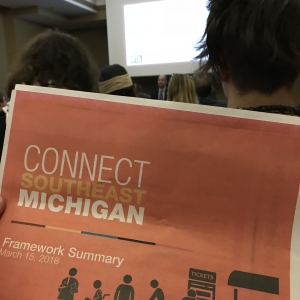Tonight, I attended the Regional Transit Authority (RTA) Detroit community meeting for the Southeast Michigan regional rapid transit plan that is being proposed with new redeeming qualities to supersede the 2016 plan that failed. That’s only if, however, it gets on the ballot in 2018… and passes.

The 2016 plan was capital-intensive for a few isolated bus rapid transit routes that did not appease voters, both transit users and not. It failed by a slim margin in Oakland Counties but by a landslide in Macomb. Supporters of the new plan say it is a more realistic step forward to enhance service levels to existing routes and build capacity for providers. Opponents say that municipalities should be able to opt out of the services if they don’t want them.
Regardless of the merits of the new plan vs. the old plan, 2 thoughts became clear tonight:
- We need to be better at having real community conversations.
The mechanism for the community to engage during the presentation was to fill out a notecard, hand it to a moderator, and wait for their question to be answered. I don’t as much mind the anonymity or the impersonal nature of the Q & A. I’m more concerned about why a public feedback session was only soliciting questions? This implies that all the answers are known and decisions have been made.
Even so, several hard-hitting questions about the politics of the RTA were answered indirectly or half-heartedly. Politically charged rhetoric could be easily stymied if more facts and less emotion took the center stage.
Takeaway: What if community meetings began with attendees acknowledging or pledging allegiance to “ground rules” that promote healthy civic discourse and respect?
2. Regional transit benefits you no matter what.
No one can deny that Southeast Michigan is hemorrhaging as young talent moves away from the Midwestern states. The Amazon HQ2 bid is a cautionary tale for the future. So, maybe we did not have what it takes for a myriad of other reasons aside from rapid transit, and perhaps losing Amazon wasn’t that great of a tragedy after all. The side effects would have been vast and unsettling.
But let’s think of it another way. Regional transit touches everyone’s lives. It supports those who do not have the privilege of having a car in this insurance-gauging state. It supports the service industries that we rely on that exist not only in Downtown, but in the suburbs, too.
And, if anything, the mobility of all people in an equitable way encourages the mobility of ideas. The mobility of ideas means the ability to innovate. The ability to innovate means sustaining and flourishing in changing times.
Tell your friends why regional transit is important to you. Tell your friends why regional transit is important to them. Play your part in mobilizing Detroit, and see you at the voting polls in November (hopefully!). Here’s how to get involved.
